Russia 'to alter military strategy towards Nato'
- Published
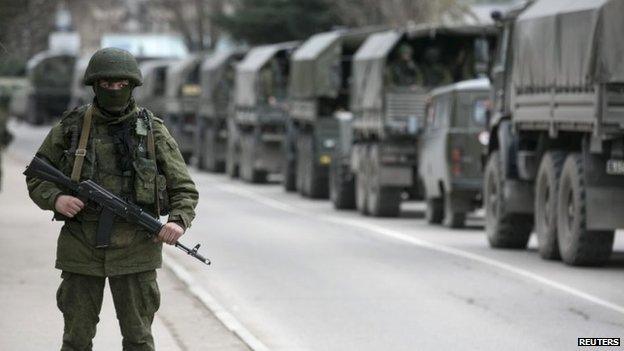
Tensions between Russia and Nato countries are high over the ongoing conflict in Ukraine
Russia is to alter its military strategy as a result of the Ukraine crisis and Nato's presence in eastern Europe, a top Russian official says.
Mikhail Popov, a Kremlin adviser, said that deteriorating relations with the US and Nato would be reflected in the updated strategy.
Nato said on Monday it would boost its presence in eastern Europe to protect its members.
Ukrainian troops are battling pro-Russian rebels in east Ukraine.
About 2,600 people have died since fighting began in April.
Ukraine's defence minister on Monday accused Russia of launching a "great war" that could claim tens of thousands of lives - claims dismissed by Russia, which denies actively supporting the rebels.
'Aggravating tensions'
Mr Popov, deputy secretary of Russia's National Security Council, told Russia's RIA news agency that "the military infrastructure of Nato member states" was "getting closer to [Russian] borders, including via enlargement".
Nato's actions were one of the key "external threats" to Russia, he said.
"Nato's planned action... is evidence of the desire of US and Nato leaders to continue their policy of aggravating tensions with Russia", Mr Popov said.
There were no details on how the doctrine might change.

Analysis - Jonathan Marcus, diplomatic correspondent
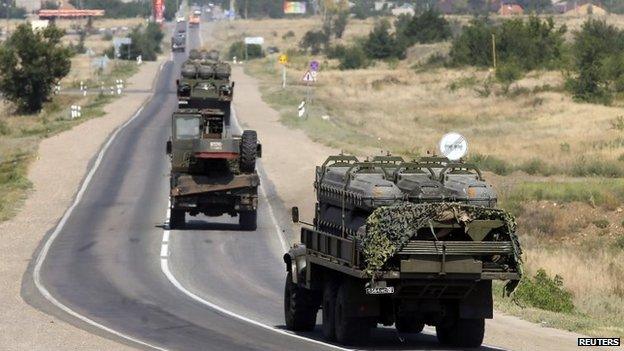
Russia has indicated it will respond to Nato's increasing presence in eastern Europe
Almost on the eve of Nato's summit gathering in Wales, the Russian government has signalled that it will respond to Nato's plans to make preparations to deploy crisis response forces to Eastern Europe, closer to Russia's borders.
Nato insists that while there will be pre-positioned supplies and more exercises in Poland for example, these will not be permanent new bases. But that is not going to cut much ice in Moscow.
The comments by the top Kremlin security adviser Mikhail Popov has signalled that these new Nato deployments, along with missile defence plans and the Ukraine crisis, will play into a review of Russia's own defence planning.
Moscow is getting its retaliation in first with the stage set for worsening tensions between Russia and the Nato alliance.
There are growing questions now as to just how far the Kremlin is prepared to go in seeking to influence the Ukraine fighting on the ground.

Nato announced its plans on Monday for a rapid response force of several thousand troops to protect eastern European members against possible Russian aggression.
The force, to be made up of troops provided by member states on a rotating basis, would be able to be deployed within 48 hours, Nato secretary general Anders Fogh Rasmussen said.
Nato Secretary-General Rasmussen: "We must face the reality that Russia does not consider Nato a partner"
Military equipment and supplies would be pre-positioned in member states in the east so the force could "travel light, but strike hard if needed", he added.
Mr Rasmussen insisted that the plans would not breach the 1997 Nato-Russia Founding Act, external, which forbids the presence of permanent bases in eastern and central Europe.
The new measures are set to be approved at a Nato summit in Wales this week.
'Runway destroyed'
The Nato security alliance covers 28 member states, including Eastern European countries such as Poland and the Czech Republic. It does not include Ukraine.
David Stern reports on Ilovaysk, a town soldiers say was emptied by pro-Russian rebels
Ukraine's Prime Minister Arseny Yatsenyuk has said that he aims to put the country on the path towards Nato membership.
Russian Foreign Minister Sergei Lavrov on Tuesday said such efforts were "undermining" attempts to reach a peace deal with the rebels.
Crisis talks between Ukraine officials, rebels and Russian envoys ended without agreement on Monday.
Ukraine's army has been forced to retreat amid a series of gains by pro-Russian rebels in both the Luhansk and Donetsk regions, and further south around the port of Mariupol.
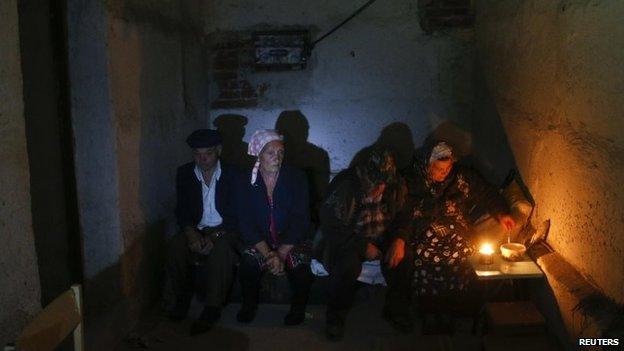
Residents shelter from artillery fire in a basement on the outskirts of Donetsk
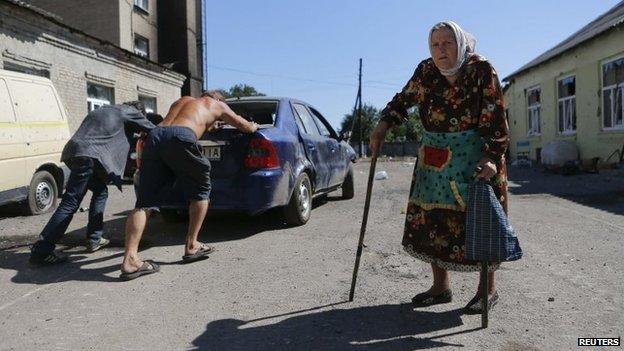
The UN estimates that at least 260,000 people have been displaced in Ukraine
Military spokesman Andriy Lysenko said that 15 servicemen had been killed in the past 24 hours, with another 49 wounded.
On Monday, Ukraine's army said it had been forced to withdraw from Luhansk airport after it was attacked by Russian tanks.
The acting Luhansk region administration chief Irina Verihina told Ukraine's 112 TV: "Our troops have withdrawn, but the runway is completely destroyed. There's no way planes can land there."
The UN's refugee agency, external estimates that at least 260,000 people have been displaced inside the country, with most of those affected from eastern Ukraine.
Meanwhile, more than 800,000 Ukrainians, mainly ethnic Russians, have arrived in Russia since January this year, bringing the total number of people displaced by the conflict to more than a million, it added.
'I can take Kiev'
Ukrainian President Petro Poroshenko has accused Russia of "direct, overt aggression against Ukraine".
Russia has repeatedly denied Ukrainian and Western accusations that it is providing troops and equipment to the rebels.
Meanwhile, a Russian official responded to allegations that Russian President Vladimir Putin had commented: "If I want to, I can take Kiev in two weeks."
The reported comments were said to be made in a phone call to European Commission President Jose Manuel Barroso, and were reported in Italy's La Repubblica newspaper.
Kremlin adviser Yuri Ushakov told reporters that whether or not the words were spoken, the quote "was taken out of context and had a totally different meaning".

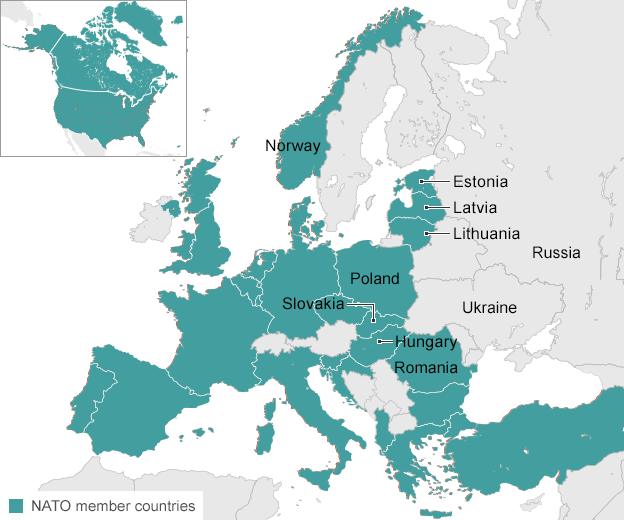

Russia's strained relations with Nato
1994 Russia joins Nato's Partnership for Peace, external
1996 Russia takes part in Nato-led peacekeeping force in Bosnia
1997 Nato and Russia sign Founding Act, external respecting territorial integrity of all states
1999 Nato admits Czech Republic, Hungary and Poland; then in 2004 admits Baltic states, Bulgaria, Romania, Slovakia, Slovenia
1999 Russia and Nato forces in standoff at Pristina airport in Kosovo; Russia earlier angered by Nato air strikes on Serbia
2003 Russia allows German forces through its territory to join Nato-led force in Afghanistan
2007 Russia suspends observance of 1990 Conventional Forces in Europe treaty (CFE) that limits heavy weapons, amid anger at US plans for missile defence system
2008 Nato briefly halts contact over Russia's war with Georgia
2011 Russia accuses Nato of going beyond UN mandate after air strikes on Gaddafi forces in Libya
2014 Nato accuses Russia of sending troops and tanks into eastern Ukraine; proposes rapid response force
